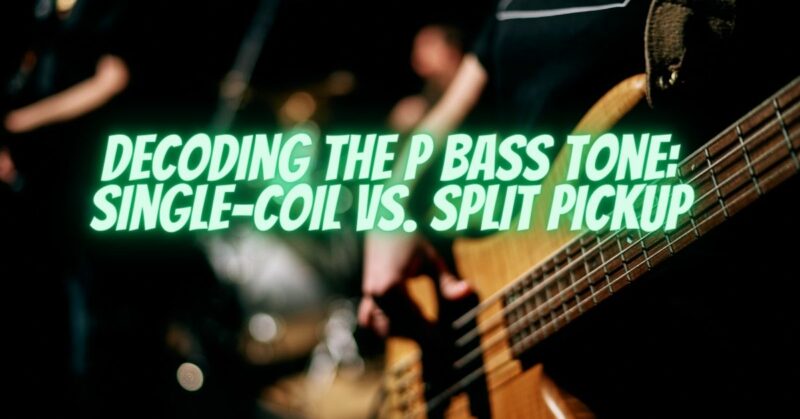When it comes to bass guitars, the Fender Precision Bass, or P Bass, holds an esteemed position in the world of music. The P Bass is renowned for its iconic tone that has shaped countless musical genres. One of the key contributors to its distinct sound is the pickup configuration. In the realm of P Bass pickups, two popular choices are the single-coil pickup and the split-coil pickup. Let’s explore the nuances of these pickups and uncover the tone differences they bring to the table.
The Single-Coil P Bass Pickup
The single-coil P Bass pickup is the original design that first introduced the world to the power and warmth of the Precision Bass. This pickup features a single coil of wire wound around a set of pole pieces, creating a magnetic field that captures the vibrations of the strings.
Tonal Characteristics
The single-coil P Bass pickup is celebrated for its classic thump and rich low-end response. It produces a warm and resonant tone that forms the backbone of many iconic basslines. The emphasis on the lower frequencies makes the single-coil P Bass pickup ideal for genres like rock, blues, and funk. Its unique growl and presence in the mix give the bass an assertive and authoritative character.
The Split-Coil P Bass Pickup
The split-coil P Bass pickup, also known as the humbucking pickup, was introduced as a response to the hum and noise issues that can be associated with single-coil pickups. This design features two separate coils, wired in opposite directions to cancel out the hum while preserving the essential tonal qualities.
Tonal Characteristics
The split-coil P Bass pickup retains the warmth of the single-coil while offering improved noise reduction. Its tone is characterized by a deep, full-bodied sound with enhanced clarity and definition in the midrange frequencies. This tonal balance makes the split-coil P Bass pickup a versatile choice that can easily fit into a wide range of musical contexts, from smooth jazz to punchy rock.
Comparing the Tones
1. Single-Coil P Bass Pickup Tone:
- Rich and warm low end.
- Signature thump and growl.
- Ideal for genres requiring a strong foundation, such as rock and funk.
- Notable presence and sustain.
2. Split-Coil P Bass Pickup Tone:
- Balanced frequency response.
- Improved noise reduction.
- Versatile tone suitable for various genres, including jazz and pop.
- Clear and articulate midrange.
Choosing Your P Bass Pickup
The decision between a single-coil P Bass pickup and a split-coil P Bass pickup depends on your musical preferences and the sonic qualities you seek. If you’re drawn to classic rock or funk and crave the authoritative growl, the single-coil pickup might be your choice. On the other hand, if you value tonal versatility and a well-rounded sound that can adapt to different musical genres, the split-coil pickup could be your match.
In Conclusion
The single-coil and split-coil P Bass pickups each have their unique sonic attributes that contribute to the distinctive voice of the Precision Bass. Whether you’re aiming for a resonant thump or a balanced and adaptable tone, both pickups honor the legacy of the P Bass and offer players a spectrum of expressive possibilities. Your choice will ultimately shape the way you communicate through music and contribute to the ever-evolving landscape of bass guitar tones.


